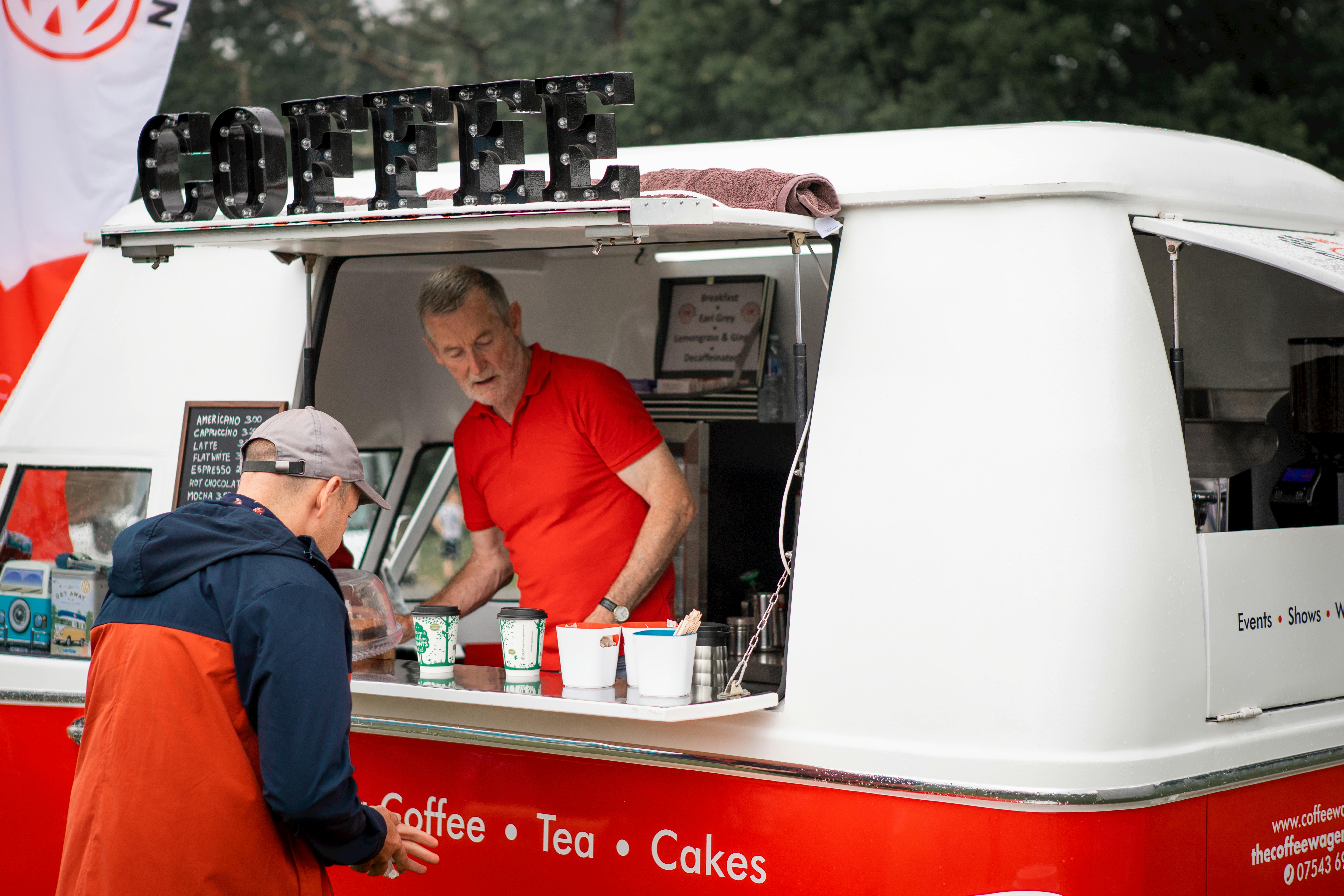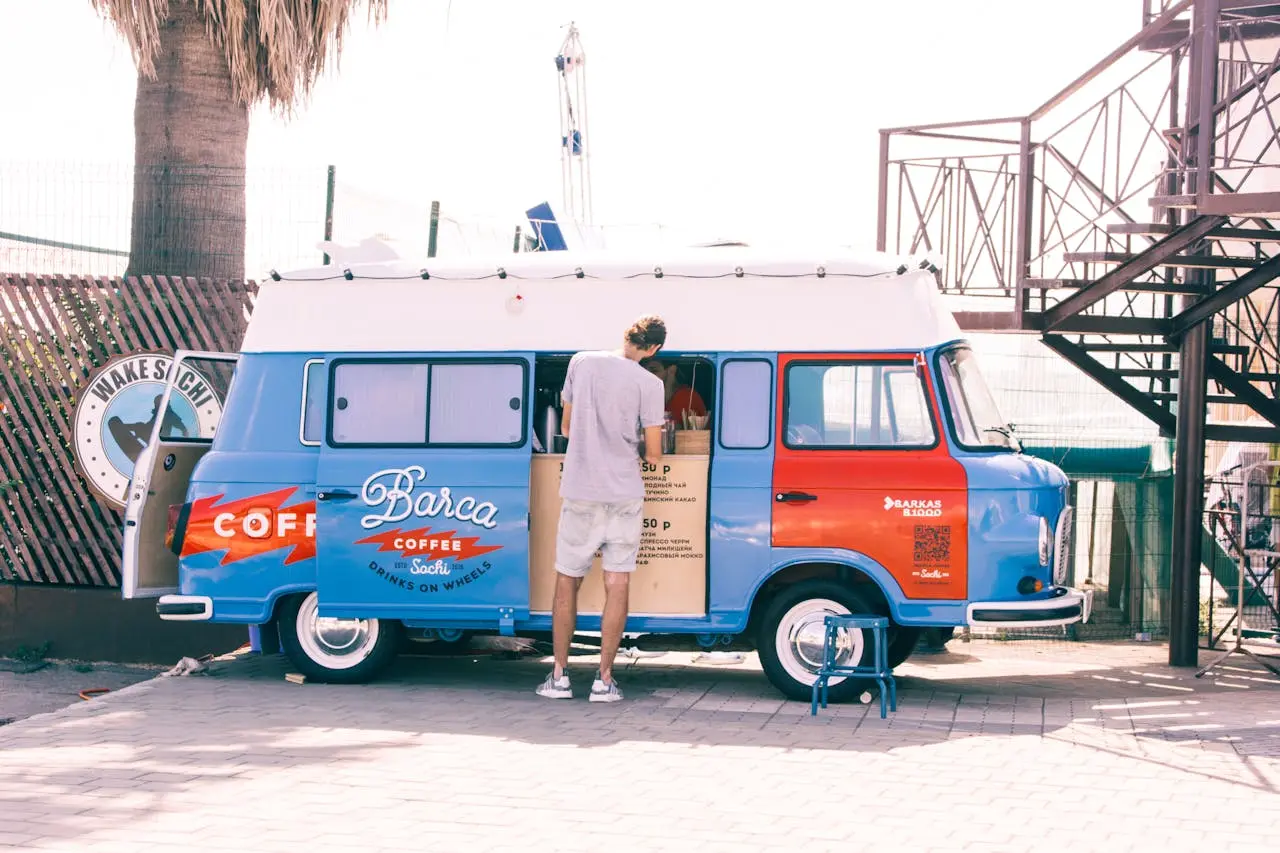Wondering how to start a coffee van business in the UK? You’re not alone. With the UK’s booming mobile catering market and growing demand for quality coffee on the go, now is a great time to get brewing. A coffee van offers flexibility, low overheads, and access to high-footfall areas like markets, festivals, and city centres. In this step-by-step guide, you’ll learn how to turn your passion for coffee into a profitable business in 2025.
Why Start a Coffee Van Business in the UK?

Mobile coffee businesses are thriving. The British public’s love of caffeine shows no signs of slowing, and many customers now prefer independent or artisan options over high-street chains. A coffee van is:
- More affordable to launch than a physical cafe
- Flexible in terms of working hours and locations
- Scalable — think events, multiple vans, or even franchising
- Ideal for testing a concept before going bigger
Whether you’re leaving a 9-to-5 job or looking for a side hustle, this business offers real potential.
Research the Market and Your Target Audience
Before you dive in, get clear on your niche and customers. Do you want to serve commuters, office parks, or festival-goers? Will you focus on:
- Organic and Fairtrade coffee?
- Vegan options?
- Unique flavours or seasonal specials?
Look at competitors in your region and assess what they’re doing right — or wrong. Understanding demand and customer preferences is essential before making any financial commitments.
Create a Business Plan

A well-written business plan is your roadmap to success. It should include:
- Your mission and vision
- Target customer profile
- Menu and pricing
- Equipment and van costs
- Revenue projections
- Marketing strategies
- Short-term and long-term goals
A solid plan not only gives you clarity but is essential if you’re seeking funding.
Register Your Business
Set up your business legally by:
- Choosing a business structure (most coffee vans register as sole traders or limited companies)
- Registering as a sole trader with HMRC or setting up a limited company through Companies House.
- Opening a business bank account
- Making sure you’re insured properly with public liability, vehicle, and product liability insurance.
It’s a vital part of ensuring you’re legally covered and personally protected.
Budget and Secure Funding

Let’s break down your estimated startup costs:
| Expense | Estimated Cost (£) |
|---|---|
| Coffee van | £8,000 – £25,000 |
| Espresso machine & grinder | £2,500 – £6,000 |
| Licences & insurance | £500 – £1,500 |
| Branding & signage | £300 – £1,000 |
| Stock & packaging | £500 – £1,000 |
You can fund your startup through personal savings, business loans, start-up grants, or crowdfunding.
Purchase and Kit Out Your Coffee Van
You’ll need a reliable vehicle and the right kit. Start by choosing a van that fits your budget and vision. Equipment should include:
- Commercial espresso machine
- Coffee grinder
- Water supply (fresh and waste tanks)
- Fridge or cool box
- Generator or battery power
- Storage and work surfaces
A smart, branded exterior is crucial for attracting customers. In 2025, energy-efficient and low-emission setups are increasingly preferred.
Get the Right Licences and Permits

To trade legally, you’ll need:
- A Street Trading Licence from your local council
- Complete food business registration with your local council no later than 28 days before opening.
- Level 2 Food Hygiene Certificate (online or in-person)
- Gas and electrical safety certificates for equipment
- A Waste disposal agreement
- Permission from landowners (if on private land)
Since licence requirements depend on location, it’s essential to verify them with your local council.
Comply with Health and Safety Regulations
Food hygiene and safety are non-negotiable. Follow FSA (Food Standards Agency) guidelines by:
- Creating a HACCP plan (Hazard Analysis and Critical Control Points)
- Keeping cleanliness logs and allergen info
- Labeling ingredients properly
- Displaying your Food Hygiene Rating sticker
Regular checks from Environmental Health Officers are standard, so be prepared.
Source Quality Coffee and Suppliers
Your coffee is your product — make it count. Look for:
- Ethical, sustainable UK-based roasters
- Local suppliers for milk, syrups, and pastries
- Compostable or recyclable cups and lids
- Suppliers with reliable delivery schedules and good customer support
Stock rotation and temperature control are key to ensuring quality.
Branding and Marketing Your Coffee Van

Branding makes you stand out and builds lasting recognition. Invest in:
- A catchy name and eye-catching logo that reflect your personality or theme
- Uniforms or aprons with your brand colours for a professional, consistent look
- A professional-looking website with an about page, contact info, and menu
- Active social media profiles (Instagram, Facebook, TikTok) for updates and customer engagement
- Listing your business on Google Maps, Yelp, TripAdvisor, and local directories
- Clear, attractive signage and branded takeaway cups for mobile visibility
Offer loyalty cards, run targeted promotions, and engage with local influencers or bloggers. Consider branded hashtags, customer testimonials, and behind-the-scenes content to build a community around your van.
Launch Your Business
Ready to go live? Create an experience that leaves a lasting impression and gets people talking.
- Choose a high-footfall launch spot such as a busy high street, local market, or community event
- Offer free samples, discounts, or a buy-one-get-one-free launch promo
- Partner with a local influencer or community group to help amplify reach
- Use local press, Facebook Groups, community noticeboards, and digital flyers to promote your launch in advance
- Capture high-quality photos and videos for social media to build your brand identity and tell your story
- Create a limited-time loyalty card to encourage return visits
- Gather feedback via short surveys or comment cards to refine your service quickly
Grow and Scale Your Business

Once established, explore options like:
- Trading at markets, festivals, weddings, and corporate events
- Adding a second van or trailer
- Hiring staff or offering barista training
- Expanding your menu (iced drinks, baked goods)
- Exploring partnerships with local businesses or charities
Track your financials, customer retention, and sales patterns to guide growth.
Common Challenges and How to Overcome Them
| Challenge | Tip to Overcome |
| Bad weather affecting footfall | Offer pre-orders, shelter options, or delivery |
| Early mornings and long hours | Schedule breaks, rotate locations |
| Council restrictions | Stay informed and compliant with local rules |
| Equipment maintenance | Have backups and regular servicing |
Flexibility and preparation are key in this fast-moving business.
Final Thoughts
Wondering how to start a coffee van business in the UK? It can be a rewarding path with the right planning and mindset. From market research to van setup, each step lays the foundation for success. Focus on quality, consistency, and customer experience — and you’ll be brewing profits in no time.
FAQs
How much does it cost to start a coffee van business in the UK?
Startup costs typically range from £12,000 to £30,000, depending on your van, equipment, and location.
Do I need a licence to sell coffee from a van?
Yes, you’ll need a Street Trading Licence and Food Hygiene registration, among others.
Can I park my coffee van anywhere?
No, you need permission from landowners or local authorities. Public land usually requires council approval.
Is a coffee van profitable in the UK in 2025?
Yes — if well-positioned, quality-focused, and marketed smartly, coffee vans can yield strong profits, especially at events and high-footfall areas
Read Also: How to Start a Courier Business in the UK: Everything You Need to Know

